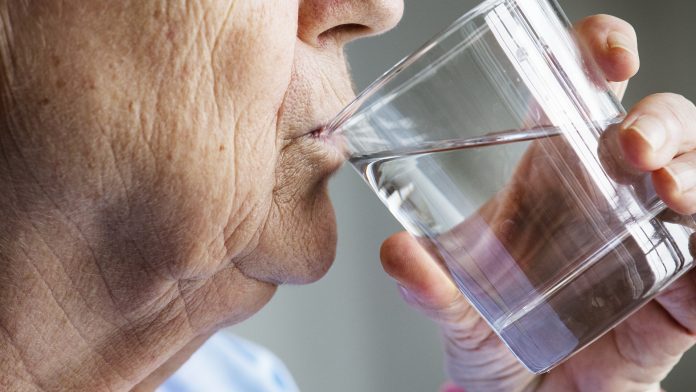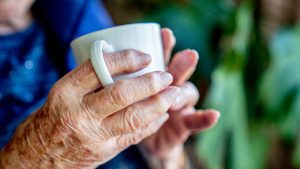
Professor Angela Kydd, Clinical Professor in Nursing at Robert Gordon University and NHS Grampian, discusses the impact of dehydration in older adults.
Food and drink are fundamental staples in our everyday lives. Not only do they play an essential part in our overall health, but they also hold holistic significance, influencing our daily habits, giving us a sense of familiarity, and helping us build relationships through social interaction. As we age the simple pleasures of food and drink become all the more profound. Yet, many older adults living in care, finding they can no longer fully dictate what they eat or drink, nor prepare their meals and enjoy these in sociable settings, can become susceptible to malnutrition and dehydration. Since around 60% of our body is made up of water, drinking enough fluids is essential for ensuring we can carry out necessary cognitive and physiological functions every day. Indeed, long-term dehydration in older adults can result in increased risk of falls, salivary dysfunction, poor hyperglycaemic control in diabetes and constipation.
There is a myriad of factors that can influence the amount of fluid older adults consume when living in care. These can include impaired mobility or cognitive abilities, a lack of consideration for a person’s preferences, or even the time at which drinks are given, which may not align with the drinking habits that they have formed over their lifetime. To discuss the challenges associated with dehydration in older adults, as well as some of the solutions that could be implemented, Health Europa spoke to Professor Angela Kydd, Gerontologist and Clinical Professor in Nursing at Robert Gordon University and NHS Grampian.
What key risk factors make older people particularly vulnerable to dehydration and its effects?
Firstly, I think it is important to highlight that while good nutrition is now being acknowledged as an essential part of healthy ageing, dehydration in older adults remains an issue that needs to be addressed. If we consider the care home sector, some residents may not want to drink simply because they do not want to bother staff with frequent requests for assistance to use the toilet. They may be frightened or embarrassed of urinary dribbling or of incontinence, so they find that the easiest thing to do is to actively avoid drinking just so they do not have to worry.
Although there may be good intentions to encourage residents to drink, if not done on a ‘little and often’ basis, then full glasses of liquids can serve to make residents feel full, resulting in some people not able to eat their meals. There is a lack of consideration for people’s lifestyle and habits, for instance, looking at the times that individuals would normally drink and their drinking preferences. Similarly, it is how the drink is presented, for example, if you get given a lukewarm cup of tea in a beaker, it is not as appealing as a hot cup of tea in a china cup. Likewise, if a resident is given orange squash and they do not like it, they simply decline a drink altogether. We need to give people the opportunity to drink what they like and when they want to and to go to the toilet without feeling like a nuisance. If a person is being cared for at home, the carer needs to offer drinks of choice to the person and to leave drinks available.
There is also a huge sense of passivity in being a recipient of care, as opposed to a feeling of consumerism which you would find in a hotel for instance. While a tourist would feel comfortable asking for a drink or to use the facilities, in care homes, or being in receipt of home care, people can feel quite powerless. Then of course, by not drinking, this can exacerbate problems for individuals which can adversely affect their health.
What signs of dehydration should carers, clinical staff and loved ones be aware of?
Common signs of dehydration in older adults are easy to spot. The individual’s mouth will look dry. Other signs are dark concentrated urine and few visits to the toilet. Another tell-tale sign of dehydration is confusion and fatigue. For people with a diagnosis of dementia this can if not diagnosed and corrected lead to inappropriate medications. Dehydration can also lead to low blood pressure, increasing a person’s risk of falls, so the implications of dehydration are really very important.
How can long-term dehydration affect a person’s health?
It can have a huge effect, it can put people more at risk of other illnesses, compromise their renal system and cognitive abilities. Long-term dehydration can lead to electrolyte imbalances, a delay in healing and increased risk of hospitalisation.
How might care providers or loved ones monitor fluid intake and encourage people in care facilities to stay hydrated?
Firstly, I would not recommend the use of fluid balance charts. I think the more paperwork we give to staff, the less time they have to carry out hands-on care. There has to be a really common-sense approach to this, where simple methods are built into part of the day and become almost routine.
Everybody I can think of wakes up in the morning and the first thing they do is take a sip of water or have a cup of tea. However, if you are a care resident, you may have to wait until someone brings that drink to you or helps you get up, dressed, and sat in a chair before you get a drink.

Illnesses and diseases such as a type of dementia mean people may not recognise that they are thirsty but can respond very well to cues. Many people with dementia might wander and one of the best ways of getting adequate nutrition and fluid into them is to have buffet style servings available to residents within the home so that they can pick at food and drink as they move around. Older people on the whole tend to prefer little and often because they cannot tolerate big meals or large volumes of fluid.
We need to consider what somebody’s life is like, listen to them, and ask questions like:
- Do you think you drink enough in the day, and if not, why not?;
- What did you like to drink when you were at home?; and
- When you were more able, when did you like to drink?
Rather than adopting a top-down approach where everybody in the home needs to have eight glasses of fluid a day, speak to residents and find out what works for them, what lifestyle habits they have developed to keep themselves hydrated in the past. Finding out what people want to drink is also incredibly important. We all have our own preferences and habits.
What policies should nursing homes and care facilities put in place to minimise residents’ risk of dehydration?
I am a great believer now in trying to affect policy. During the work I am doing on setting up an integrated network for ageing across the life course, I found the most wonderful policy documents with fantastic recommendations. The challenge is how to harness these recommendations and policies and make them easily accessible to staff.
The overriding default when people talk of care staff is that carers and nurses need more education, but I do not think this is the answer, nor is it motivational for staff. If we looked at every educational resource available for social care, we would be very smart, but not necessarily the best carers. There has to be a common-sense approach to the factors that bind to a healthy lifestyle.
The things that get neglected most in health and social care, are food, drink, and sleep. If you do not have enough food, drink, and you do not sleep properly, you are not a well person. Therefore, if you are a health or social care provider, a friend, or companion, you have to think about the basic physiological needs of that person in order to help them live well.
Do you think so-called ‘champions’ can therefore be beneficial in care homes in supporting staff and implementing good care practices?
I think there is the danger with champions. Ensuring people have adequate nutrition and fluids is part of every carer’s job. All staff need to be involved in the care plans for each individual resident. They also need to be able to report back to senior staff on their assessment of the residents’ wellbeing. This will of course include any changes to the residents’ health and wellbeing. It is vitally important to value care staff and make sure they know they are appreciated for the work they are doing. What carers need is to be acknowledged and feel proud of the important role they have in a resident’s life.
If we concentrate on individualistic care, how people live their lives, what we can augment to make their lives better, whether it be biologically, psychologically, or socially, then we should be able to act on that. The premise of any care is to do no harm and to do good, but we are doing harm by letting people become dehydrated.
Angela Kydd
Clinical Professor in Nursing
Robert Gordon University and NHS Grampian
rgu.ac.uk
https://www.linkedin.com/in/angela-kydd-6674b854/?originalSubdomain=uk
This article is from issue 19 of Health Europa Quarterly. Click here to get your free subscription today.









